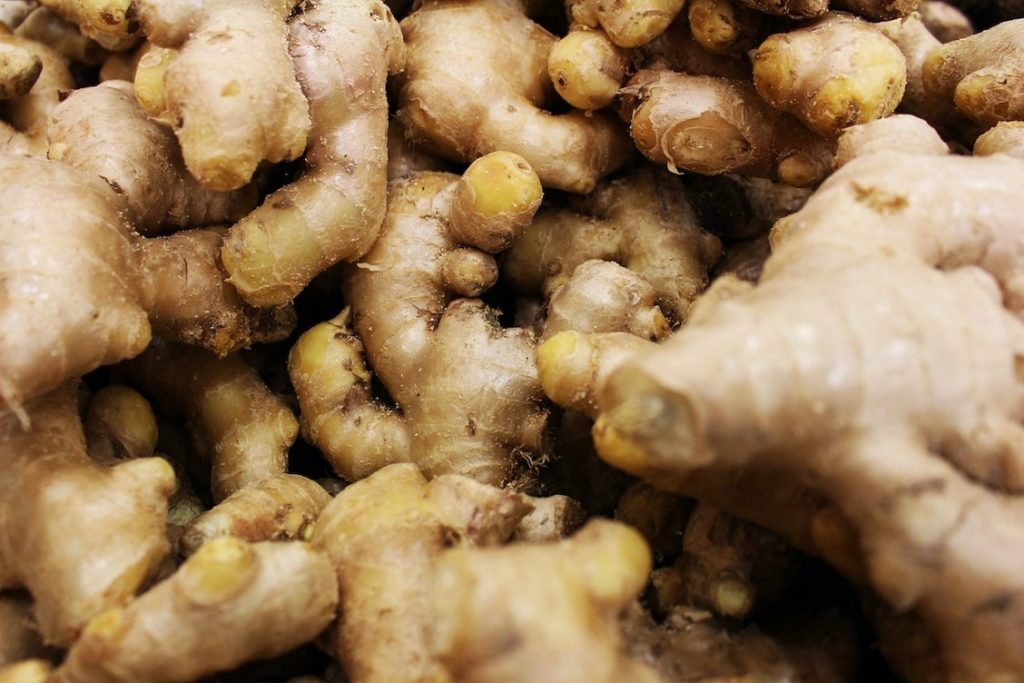
Description
Ginger is well deserving of its designation of Herb of the Year. Ginger, Zingiber officianale, is a member of the Zingiberaceae family. It grows all over the world in tropical and warm climates. You can grow Ginger wherever you live, however, and I’ll tell you more about that below.
The plant grows tall and lush when given ample water and sunshine. In climates where it’s very hot and during dry spells, be sure to keep your ginger well watered and a little shade won’t hurt it.
How to Grow Ginger
Commercially, Ginger grows and is harvested in one season. Plant the rhizome in spring and grow it out all season. In the fall dig the rhizome, and, if you live in a warm winter climate, replant part of the rhizome for a new plant. You can also, at this time, plant the rhizome in a pot and keep it indoors if you live where it’s cold in the winter. Give it lots of light and regular water and you’ll have a little plant to plant out in the Spring or to keep in a pot. It makes a pretty patio or deck pot and you can still harvest it for use.
It’s easy to grow ginger from the rhizomes you can buy at most grocery stores. Pick ones that are plump and healthy looking. Look for “eyes” on the rhizome- this is where the tops grow out from. Plant the rhizome horizontally- flat – under about 1 inch of soil. This is the same whether you’re growing in the ground or in a pot.
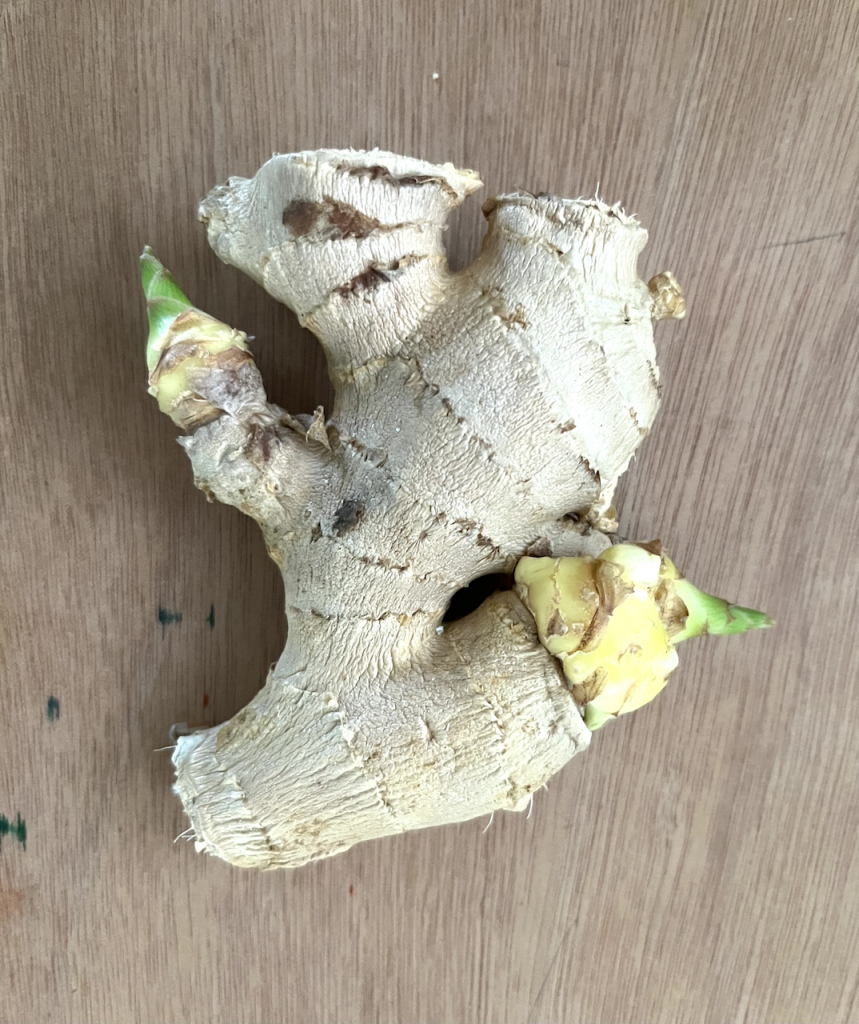
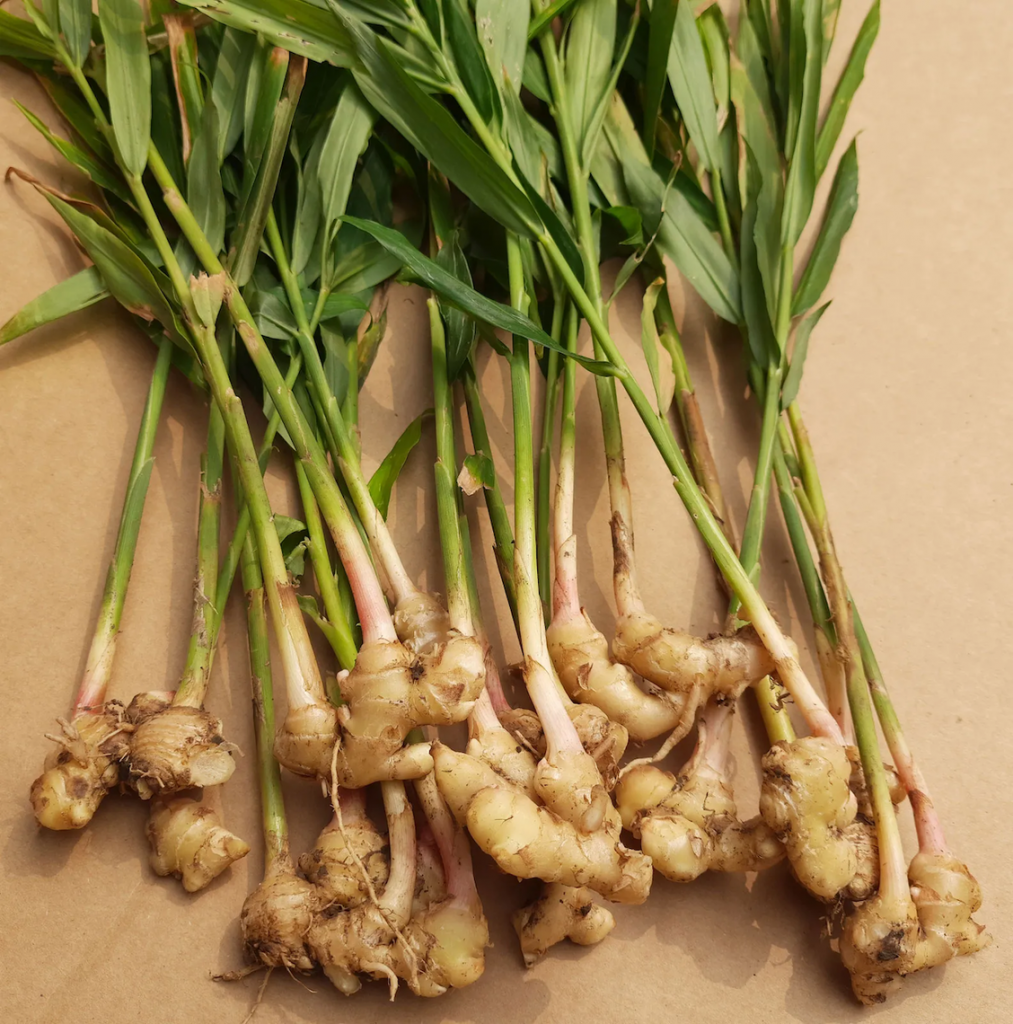
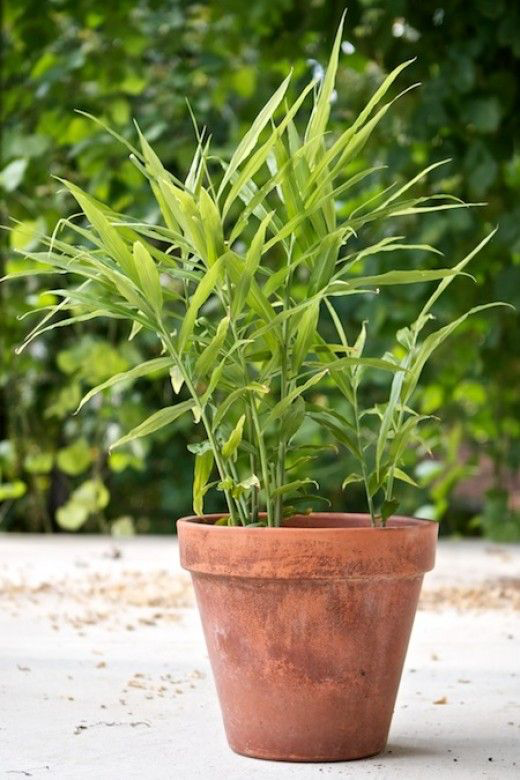
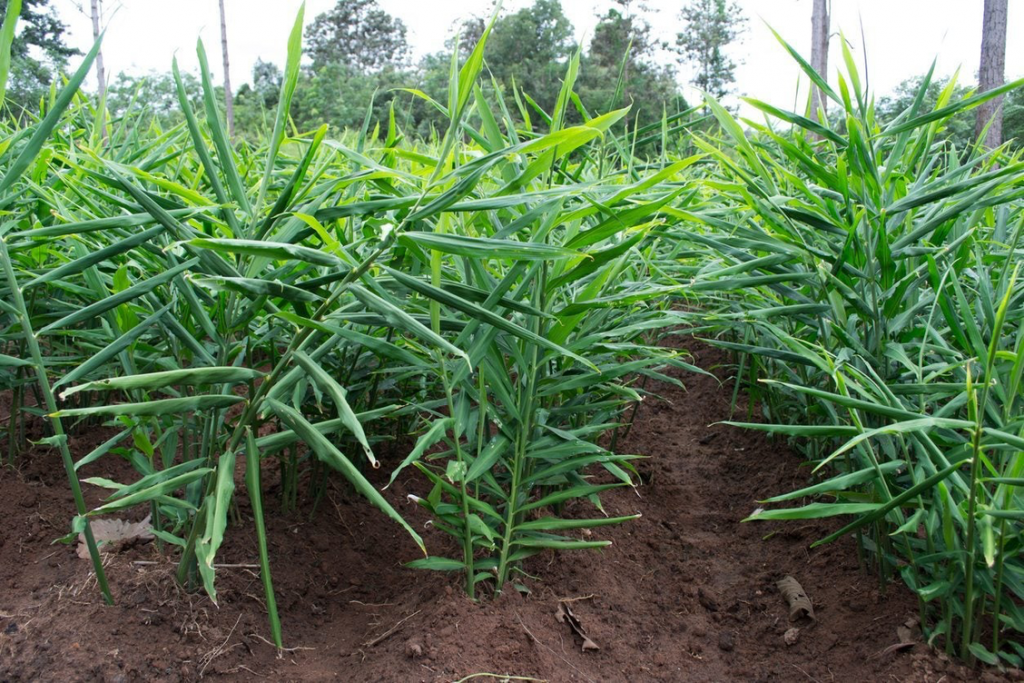
Ginger for Wellness
In Ayurvedic healers call Ginger the “Universal Medicine”. It has a long use in Traditional Chinese Medicine (TCM), going back centuries. There are many reasons for this. Ginger is beneficial to many systems in our bodies: respiratory, circulation, digestion and for pain management. It is easy to access and easy to use.
Ginger Tea
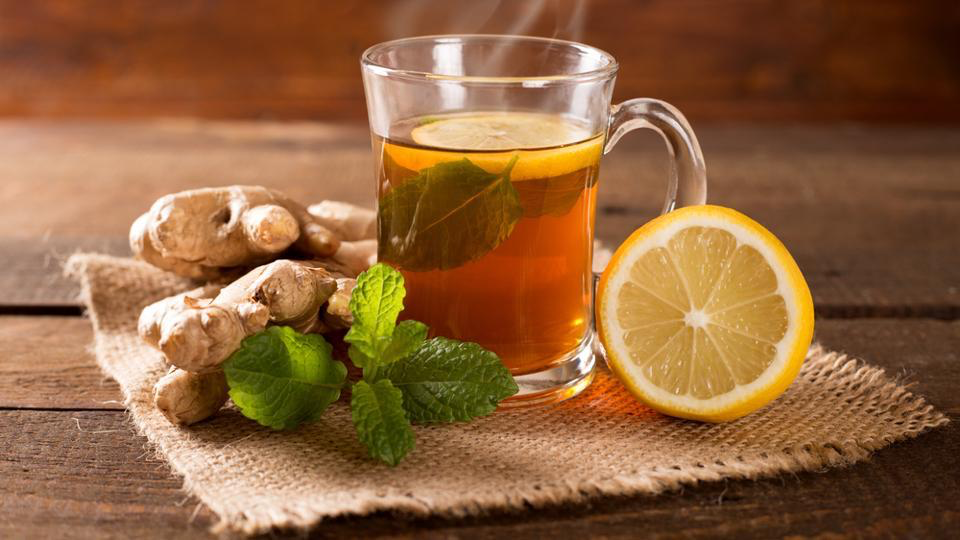
By far the easiest way to use Ginger is in tea. Slice some fresh Ginger, no need to peel it, place it in a cup and pour boiling water over it. Wait 10 minutes, strain out the pieces of Ginger if desired, but not necessary, and sip it. You can sweeten your cup with honey or other sweeteners. Honey adds another layer of healthiness and is great when you have a cold or sore throat. A few slices of lemon adds vitamin C, which helps with a cold. Steeping lemony herbs such as lemon balm or lemon verbena also adds extra benefit. Use a tea ball for the herbs so you can remove them after about 10 minutes.
Uses
There is lots of information on the Internet about ginger, its uses and “miracle” properties. Modern herbalists use Ginger for a variety of conditions. Ginger is NOT, however, a miracle cure. (Nor is any herb or food, for that matter.) Ginger tea will help relieve a sore throat. It will warm you up if you have chills. The energetics of ginger are warming and drying. Dried ginger is much hotter than fresh. So, if you’re making tea with dried ginger, be aware it will be hotter than if you made it with the fresh rhizome.
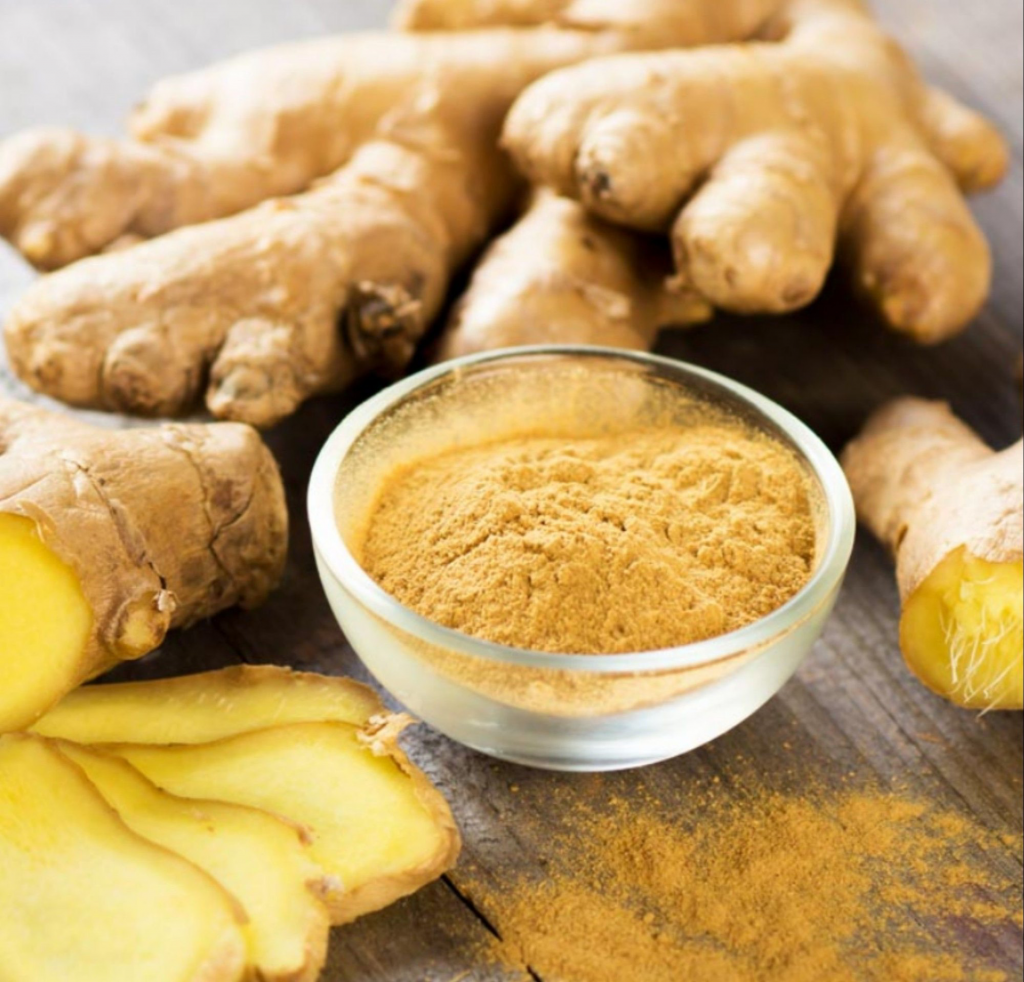
Rosalee de la Foret of Learning Herbs says the following:
FOR COLDS AND THE FLU
Ginger can be used for many different complaints during an upper respiratory system infection. In fact, if you only had one herb to choose from during a cold or the flu, ginger may be the one, especially when there are signs of coldness and dampness.
Sore Throats
Sipping ginger tea or having a spoonful of ginger-infused honey can bring relief to a sore throat. It’s also antimicrobial, helping to prevent further infection. I prefer fresh ginger for this.
Congestion
Ginger is diffusive and stimulating and is perfect for getting stuck mucus flowing again. A strong ginger tea can relieve congested coughs and stuffy sinuses. Ginger can also be used externally over the chest to relieve congestion.
Warming Up/Fever
Feeling cold? A strong cup of ginger tea can warm you up from the inside. This is helpful for the onset of a cold or flu, especially when someone feels chilled and is shivering.
Ginger for Digestion
Ginger helps with digestion because it helps move the blood through the body. If you suffer from any of the following symptoms, you might have ‘stagnant digestion’.
Symptoms of stagnant digestion include:
- bloating
- gas
- feeling heavy after meals (bowling ball stomach)
- constipation
- people with stagnant digestion may also have cold hands and feet
A cup of fresh ginger tea after meals can help relieve these symptoms.
Ginger for Pain
Ginger can help with pain. It works through its anti-inflammatory and dispersive mechanism. Taking powdered ginger capsules or ginger tea can help relieve the pain of osteo and rheumatoid arthritis. Ginger helps relieve cramping pain such as in over worked muscles and even menstrual pain. Use a salve made with ginger infused oil for topical pain relief.
In Conclusion
Ginger is a strong herbal ally that most people can take daily. It is safe for most people. If you decide to embark on an herbal course of healing yourself, please consult your physician, especially if you are taking prescribed pharmaceutical medications. Or, find a qualified herbalist to help you.
The following websites have more information on Ginger.
- https://blog.mountainroseherbs.com/ginger-root-history-and-recipes
- https://learningherbs.com/remedies-recipes/boost-immune-system-with-ginger/
- https://kamimcbride.com/?s=ginger
Download a Ginger Recipe Card from Learning Herbs
SPECIAL CONSIDERATIONS
Ginger is very warming and somewhat drying and is therefore not a good match with someone already showing signs of heat and/or dryness. It should not be used in large amounts during pregnancy. Patients taking blood- thinning medication and other pharmaceuticals should consult with their doctor before taking large amounts of ginger regularly.
DISCLAIMER
These statements have not been evaluated by the Food and Drug Administration. This information is not intended to diagnose, treat, cure, or prevent any disease.
I am an affiliate for Botanical Interest Seeds. I make a little bit of money from each purchase at no cost to you.
I plant my own gardens with Botanical Interest Seeds. As a bonus, the seed packages have lovely watercolor drawings depicting the finished products. There is so much good information on each seed pack as well as on the inside of the package, too.
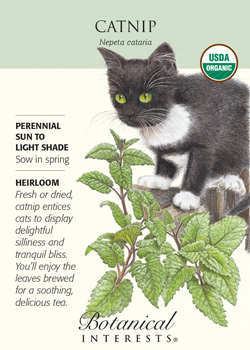
They have a full selection of seeds for herbs, flowers and vegetables. Their articles on growing and harvesting are very useful. On the website, you can also sign up for the 2023 Seed Catalog. Click the picture, above.
Until Next Time,
Be well, enjoy your herbs and gardens.


